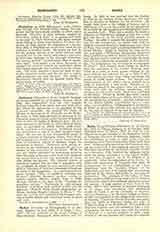

Bachiarius, an early fifth-century writer, known only through two treatises which warrant the conjecture that he was a monk, possibly an abbot, and a Spaniard. The first of these writings, entitled by Gennadius “Liber de Fide” is an apologetical letter to the pope in which Bachiarius, like many another monk coming to Rome from Spain at the time, vindicates his faith against the suspicions of a heterodoxy akin to Priscillianism which were based on his residence in heretical lands. He points out that he left his country because of its errors (whence some conclude that he was exiled) and makes a profession of faith that witnesses to his thorough orthodoxy. The second, entitled “Ad Januariam liber de reparatione lapsi”, is an appeal to an abbot, Januarius, to mitigate his severity towards an incontinent monk who though repentant was excluded from the monastery. The letter breathes a beautiful spirit of prudently tempered charity and like the first is replete with scriptural texts and allusions. The theory of Bachiarius’s identity with the Spanish bishop Peregrinus seems untenable.
JOHN B. PETERSON

